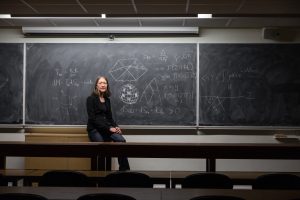For the first of the interviews in our series, we spoke to Professor Fay Dowker, who is Professor of Theoretical Physics at the Department.
As a little introduction, what area of Physics do you specialize in?

I work on quantum gravity which is a name we give to a “problem” rather than a “theory”. The problem is that our current best understanding of gravity — General Relativity — and our current best understanding of matter — Quantum Theory — do not fit in the same conceptual framework as each other. Sometimes people say they are “contradictory” but on the other hand, each one is very successful in a certain realm. Those of us working on the problem of quantum gravity are trying to go beyond those realms — for example at the Big Bang and at the singularities of Black Holes. We want to find an overarching framework for all of fundamental physics that will recover the theories we know when we know they work and extend our understanding so we can answer questions like “what happened before the Big Bang.” My particular work is on an approach to the problem of quantum gravity called Causal Set Theory in which spacetime is hypothesised to be fundamentally discrete or granular. My work also involves the foundations of quantum mechanics because the problem of quantum gravity forces us to face up to — what I consider to be — the incompleteness of our understanding of quantum theory and what it is telling us about the nature of the quantum world.
What kickstarted your career in Physics?
I started out studying Maths at uni and then I took a course on General Relativity and I was hooked. From then on I just wanted to know more about GR and spacetime and that feeling and motivation has never gone away.
During your journey, what has your experience of being a woman in Physics been like? Both positives and negatives!
 The feeling of solidarity with other women is positive. I am very disappointed that the proportion of women in my area has not increased substantially over my career: it was low when I started and it is still low. I have some sympathy with the controversial concept of feminist science and the concomitant thesis that the actual content of successful scientific theories has “masculine” aspects. However, it is hard for me to see what a feminist approach to the problem of quantum gravity, for example, might look like and I have not seen any concrete examples. The positives include the experiences that make being a physicist rewarding in general: international collaboration and being able to work with people without boundaries and without borders, the thrill of introducing students to treasures of human knowledge and understanding and the essentially creative aspect of physics — the creation of new knowledge — which is deeply satisfying.
The feeling of solidarity with other women is positive. I am very disappointed that the proportion of women in my area has not increased substantially over my career: it was low when I started and it is still low. I have some sympathy with the controversial concept of feminist science and the concomitant thesis that the actual content of successful scientific theories has “masculine” aspects. However, it is hard for me to see what a feminist approach to the problem of quantum gravity, for example, might look like and I have not seen any concrete examples. The positives include the experiences that make being a physicist rewarding in general: international collaboration and being able to work with people without boundaries and without borders, the thrill of introducing students to treasures of human knowledge and understanding and the essentially creative aspect of physics — the creation of new knowledge — which is deeply satisfying.
